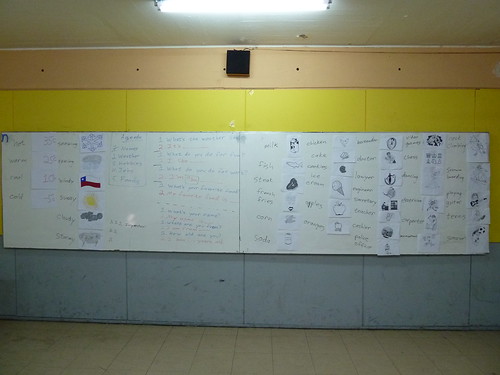Today they campaigned harder, and of course no one had actually talked to the Curriculum Overlords (perhaps thinking they had a better chance with me alone), so when they came to my classroom, I said, "Okay, let's go talk to the U.T.P., the rest of you hang out here." I don't know the rules of the school very well, it'd be a pain for me to delay the test, and I didn't like the power dynamics of me making the decision--of either giving in to a silly student demand (they knew the test was coming and we prepped for it last week), or of their perceiving an injustice if I remained hard-nosed.
Funny enough, the three students went in to talk to Uberlinda, the Power-That-Is, and when I showed up a few steps later, her assistant Claudia basically blocked the door and asked how she could help, so I had to say "I'm with them" to get in to watch the conversation.
Uberlinda told them they were SOL: that yes, they can only have two tests in a day, and that's all they have, the Biology project is something they're supposed to do at home, well before the day it's due. So we went back to the room and crushed everyone's hopes and started the testing.
The test was two parts, equally weighted: give me the English words for 10 pictures, and then ask me 3 of the 4 questions we learned (things like "What do you do for work?" and "What's your favorite food?". I'm pretty generous by American standards, and I try really hard to help the kids get at least partial credit, by prompting them with initial consonants and stuff. Even so, we had a few bad results and one set of tears, and several requests for a way to raise their grade.
In a school where their learning experience were reasonable (especially if I were creating it), I'd say "tough," but...a lot of these kids already have lousy grades in English, and if they don't keep their grades up, they'll get booted out to another school. I know for a fact that these are smart kids, and most of them aren't any lazier than normal 15-year olds; and I know that between the huge, untracked classes and bad curriculum, their overall English-learning experience is crap.
Maybe they'll succeed under the Chilean system, maybe they won't; but I think I want to help them as much as I can while being fair to everyone and still insisting that they be assessed on what they know.





